Hello, it’s been a minute since I last wrote an article. I’m long overdue.
Thank you for all who have come along on this ride. I’m truly #blessed to have a great audience who inspires me to write. Sorry for the cringe.
I received an awesome DM from someone who gave a great compliment, and then proceeded to roast me for not posting recently. You guys are great (I mean it).
Today I’d like to address a difficult topic. I don’t mean it’s difficult for *me* to talk about, but rather a topic where dissenting opinions are suppressed in society. How interesting. A nation of freedom where the predominant media ideology produces a hive mind on social media where anything different is deemed a threat. A threat to *what* I'm still trying to determine. Maybe just a hurt ego when trusting the "science" didn't fix your problems after all.
That topic is mental wellness.
My source for today’s [highly reputable] information?
Now that the prerequisites for why you should listen to me are out of the way, let’s get into it.
First thing, welcome to the first “opinion” edition of the AG blog. Call it an editorial. I’m not here to tell you what’s right or wrong, rather I hope you challenge these concepts, or at least think critically about them. I am also not a medical professional, and this is purely opinion.
Acid Gambit is not just physical fitness. It’s a blend of all domains to produce the most well rounded athlete. And how good of an athlete can you be without the mental piece?
I want to start with what goes in our bodies. Common practice from mental health professionals seems to be a high rate of prescriptions. But the idea of starting with physical fitness and everything else that goes in our bodies impacting our mental health? Ludicrous, apparently.
Obviously prescription medication can and do impact our brain. So why would be believe otherwise for the types of food we eat and substances we ingest?
Alcohol is a prime suspect to begin with.
The last drink I had was on December 31st, 2024. Today it’s been 115 days since starting. I did the same thing last year, and remained *largely* sober until the summer. There may have been a few drinks sprinkled in late spring. But this year it’s been different - absolutely nothing. Previous to last year, the longest I had gone without drinking post 21 years old was Ranger School, but unfortunately that was only 62 days (why would I recycle lol).
So what impacts have I noticed?
Increased mental stability. I’ve never been one to fly off the handle for better or for worse. Instead, what I’ve noticed are the highs and lows are closer to my mean “set point” mentality. If I were to plot it on a graph, the spikes are much lower, both in the positive and the negative. So one might ask, why would I go sober if I lose the highs? For some, the loss of the negative spikes may be enough. But another reason exists - the mean line has improved drastically. So my baseline rose. Continuing to drink regularly suppresses that.
Of course there is sufficient data to back this claim. It is known that there is an extended period of depressed dopamine after a night of drinking. Depending on the person, this can be hours to days long. I believe I've talked about this before, those *most* at risk for chronic alcoholism are individuals who don't get the low periods after drinking. Additionally, the perceived "high" tends to increase after every drink - whereas normal humans experience a high after the first few drinks, then it subsides into the following lull I just described. But the most important data point is how I *feel*. When doing anything that impacts our bodies, data is great. But different things work for different people, so truly evaluate its impact on you.
Back to the chart. As a result of not drinking, my baseline relative wellness rose. I generally feel great every day. Yes, the highs are lower than what I get from alcohol. But even higher peaks are possible purely as a result of having a higher mean wellness. And there is a reason I chose the word wellness over a term like happiness. My overall feeling of wellness has risen. I choose wellness over happiness (especially as men) because I don't believe we should strive for happiness in life. I've found more fulfillment in doing and building things, like my body, aerobic capacity, relationships, software, and even woodworking than typical "happy" things (which mostly are status goods/travel/substances if we look to society).
The other major impact is physical performance. My recovery has improved drastically, as well as improvements in strength and speed. Additionally, I feel like I *maintain* performance better in the absence of structured training. I took 2 weeks off from running due to a foot injury and felt great, immediately upon return. Also, an injury that felt serious completely resolved itself in less than a month. Obviously I don't have a point of comparison to what it would have been if I was drinking 1-2 nights per week, but I suspect it was better.
Last note on alcohol - I have no problem with irregular use. Having a drink or two on a date, at a major event, or the holidays. After all, it does produce a high, promotes social interaction, dancing, and general wellbeing (in the moment). As long as you don't have a serious problem with it (or a genetic predisposition to alcoholism) there is nothing wrong with drinking every now and then.
Along with alcohol, the foods we eat impact our overall wellbeing. This is an interesting topic where the science is unsure. So we go back to the most reliable metric - how we feel.
The assumption that fried foods make you feel worse and eating sufficient lean protein, fruits, and vegetables makes you feel better tends to be true in most cases for the most people. It's astounding to me that doctors treating patients for mental health don't immediately get them on a clean diet and remove substances. But that would hurt their bottom line, huh?
Anyway, the food we consume attacks (or helps) us on two fronts. Number 1 is the immediate impact based on macro- and micro-nutrients. We eat for energy and performance. Do you think you will perform better on an exam if you eat some eggs and watermelon or a muffin? The same applies for any physical event. This is not to say that you cannot perform well on trash food. Below is a peak athlete after a leg of the Tour De France smashing the "worst" food imaginable. Yet he's a top athlete? There's a time and place for calorie-dense food. Use it wisely.
Number 2 is the delayed effect of food. This includes its impact on our sleep, inflammation, and overall feeling of wellbeing. I know I feel better after a ribeye than I do after fried chicken. (Literal) food for thought.
The last point on "what we put in our bodies" is substances other than alcohol. This includes caffeine, nicotine, and drug use.
If you struggle with neuroticism, mood swings, or poor sleep, caffeine, nicotine, and recreational drug use would be the first things to cut. Again, this is not to say they don't have their place (except for drug use - I have zero tolerance for that. Research is finally coming around on how bad marijuana is).
That pretty much wraps up "things that go in our body". The bottom line, be aware of what you consume. Chances are, it has a bigger impact than you think, on both your mentality and your physique. Additionally, you will notice all of these are grey, rather than black and white. I only have a zero tolerance policy when it comes to drug use. This does not include psychedelics. While I have not used them personally, I don't believe they fall in the same category of recreational drugs (unless you use them regularly, in which case stop). There's a ton of research to be done on their benefits in the mental wellness space, as well as numerous benefits when it comes to PTSD and treating veterans.
Next, the power of writing, and more specifically putting your thoughts into the physical realm.
A popular indie app developer @levelsio on x.com just dropped a new (and profitable) AI chat app as a therapist. Now here me out.
I have mixed views on therapy. This clip sums it up well:
Therapy ends up becoming an endless cycle of ruminating on negative life events that never actually help you. Another view:
We know self examination is good. So how do we partake without getting sucked into a years long engagement with a therapist that may or may not actually help?
Obviously some, not all, have a net negative on their clients. I think a good distinguishing factor is one who will allow you to find your soft spots and work through them, not get into a vicious loop of constantly talking about dark points. One way is to put words into the physical realm. Writing is a form of thinking, and as Jordan Peterson puts it, the most demanding form of thinking. And it takes a scramble of thoughts, forces you to create a cohesive statement, and make it real. It’s no longer a figment of your imagination.
Back to the @levelsio app, it isn’t a real therapist. It’s an LLM tailored to respond with therapist-like pokes to get to the truth of whatever you’re dealing with.
The reason I liked it after 3 minutes is the responses didn’t matter - it was a forcing function to write down what’s on your mind and make it real in the form of a cohesive statement.
As for therapy, I have mixed feelings on if it’s actually helpful. But certainly writing things down and forming real arguments is an excellent way to structure my life that may be beneficial for you as well. That’s another reason why I like substack so much. I’m forced to produce a real argument with evidence to support it. And unscramble my thoughts into something digestible.
All of this to say - writing is a superpower that will make you more efficient, a better thinker, and stronger mentally, all the while clearing out negative thoughts once you see what’s real and what isn’t.
The last topic I want to cover is the impact of physical training on mental wellness, and more specifically, depression. In The Best Types of Exercise For Depression (Pfiffner, 2024), the author summarizes the effects of physical exercise on 14,170 participants with major depression.
It is clear exercise is beneficial to mental wellbeing. I really liked the final paragraph:
Ultimately, exercise should be treated as one possible tool to help treat depression. Rather than worrying about what specific type of exercise is best, individuals should seek out physical activities that are most enjoyable to them personally and that can be adopted as a regular part of their life.
It emphasizes the distinct difference between training for performance and training for well-being. While ideally there should be a blend of both, what matters most is moving, and the actual enjoyment you get out of it. Personally I’m lucky to be obsessed with running as it’s great for both performance and my headspace.
To sum up, these are just ramblings, and do with them what you will. There are things that, as Elon Musk puts it, you can’t “think your way out of.” This is a case where professional intervention is required, by way of therapy, prescription medication, or other methods.
But to not apply the tactics discussed today as a first line of defense is ludicrous. It’s similar to physical fitness. Do you think that taking copious amounts of supplements will move the needle when it comes to improving physically? Or doing the basics like sleeping 8 hours per night, getting ample rest, and training to failure 3-5 days per week?
We do the basics that are in our control first, then look to other means of improvement/resolution. There are so many methods to improve our mental wellness that are completely in our control, and largely free (or could even save you money).
Have a great day.
Cheers.
DISCLAIMER
This is not Legal, Medical, or Financial advice. Please consult a medical professional before starting any workout program, diet plan, or supplement protocol.




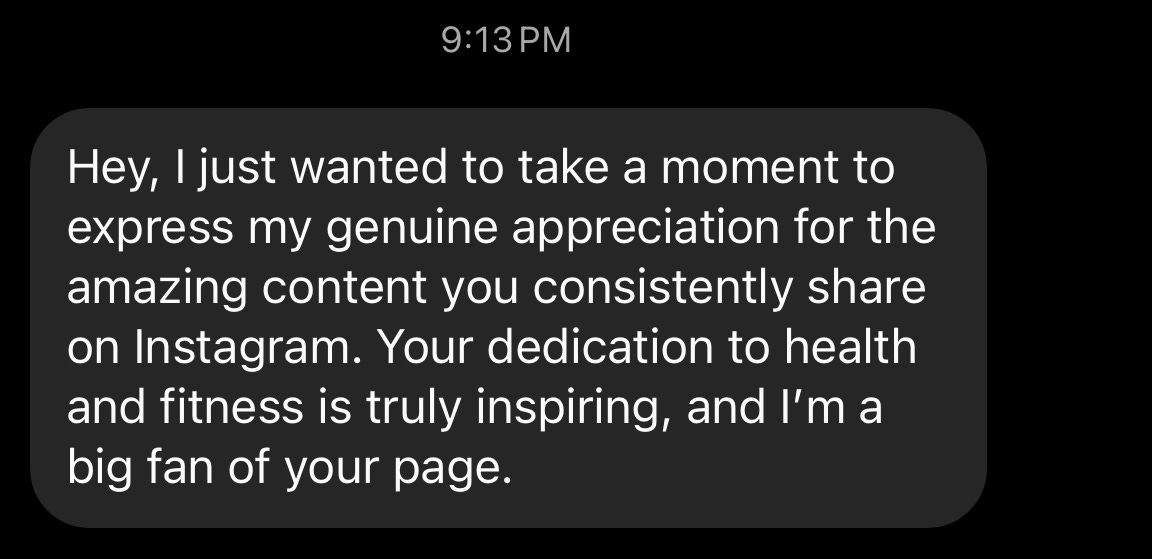

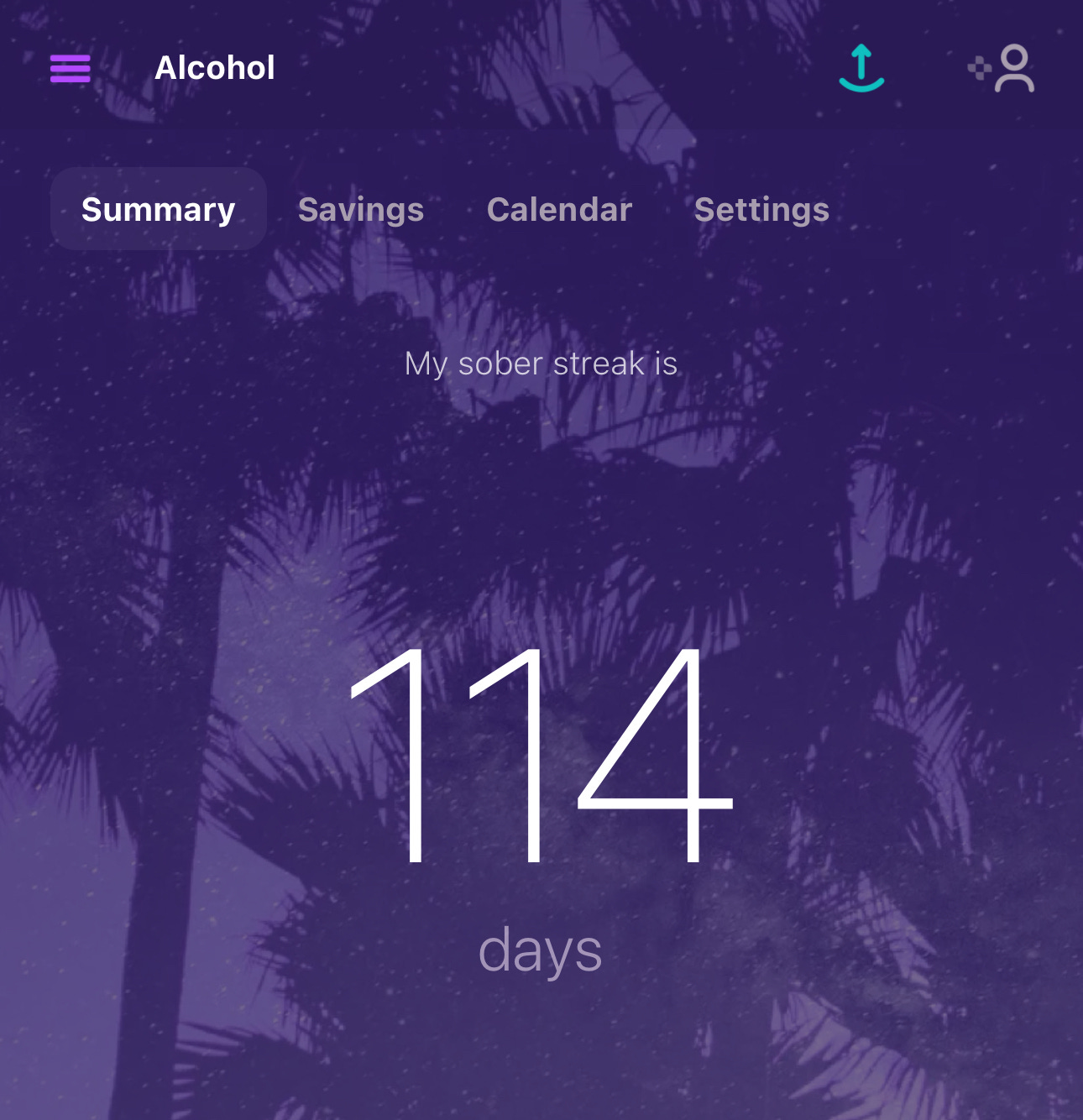
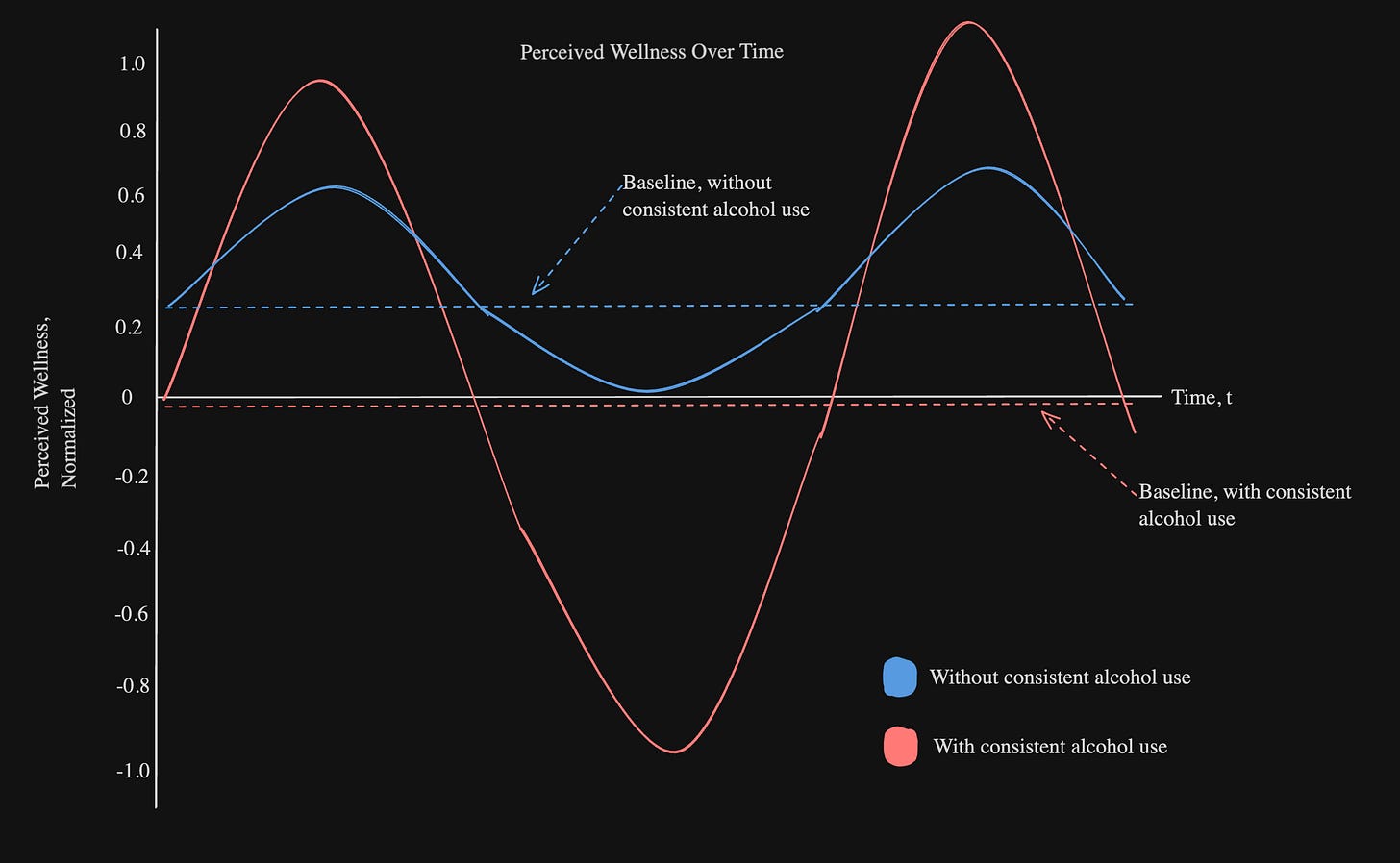
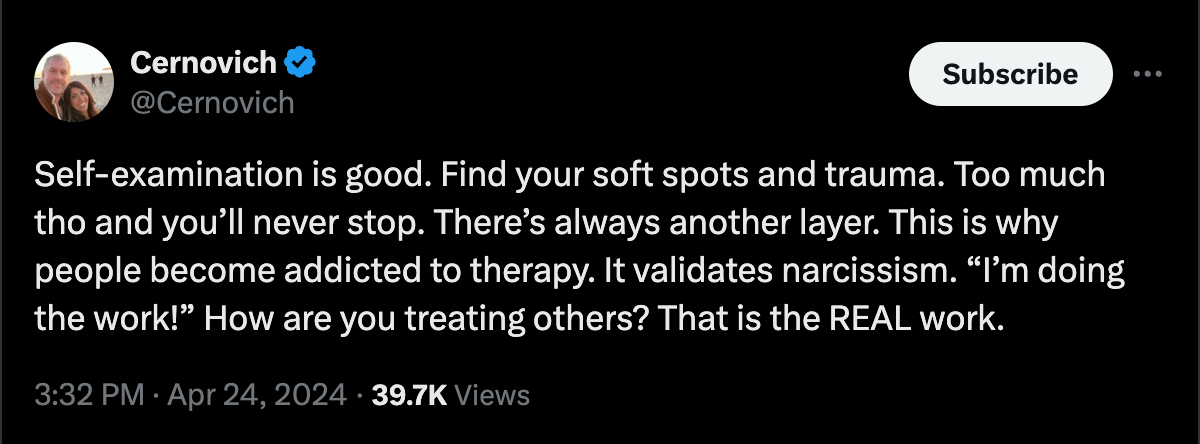
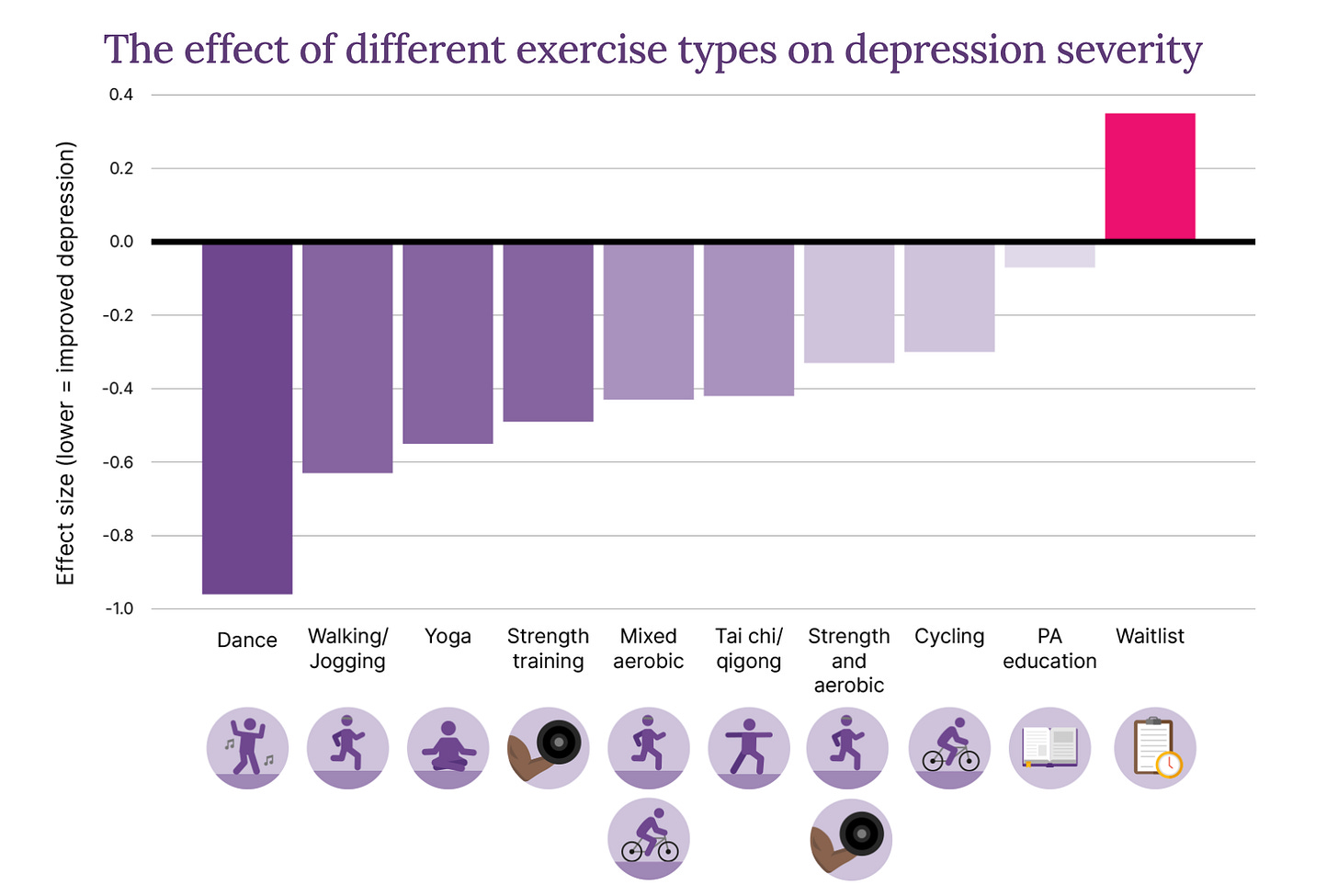
and another work of art - best $50 ever spent
Love this!